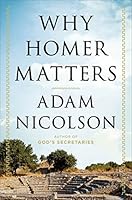
## Metadata
- Author: [[Adam Nicolson]]
- Full Title: Why Homer Matters
- Category: #books
## Highlights
- Goethe thought that if only Europe had considered Homer and not the books of the Bible as its holy scripture, the whole of history would have been different, and better. ([Location 352](https://readwise.io/to_kindle?action=open&asin=B00IQOC3AM&location=352))
- “Each time I put down the Iliad,” the American poet Kenneth Rexroth wrote toward the end of his life, after reading it again in some new translation, or after reading once more the somber splendor of the Greek, I am convinced, as one is convinced by the experiences of a lifetime, that somehow, in a way beyond the visions of artistry, I have been face to face with the meaning of existence. Other works of literature give this insight, but none so powerfully, so uncontaminated by evasion or subterfuge. ([Location 395](https://readwise.io/to_kindle?action=open&asin=B00IQOC3AM&location=395))
- Homer ripples around the ancient Mediterranean and even farther afield, taking on local color, not a man or a poem but flickering, octopus-like, varying, adopting the colors of the country he found himself in. None of these local versions survives as more than a reference or two in ancient scholarly notes, but they hint at a reality that would have made William Cowper’s or Alexander Pope’s hair stand rigid. Homer, before Alexandria, was multiplicity itself. ([Location 925](https://readwise.io/to_kindle?action=open&asin=B00IQOC3AM&location=925))
- The Pithekoussai wine cup marks the limits of the written Homer. It is the edge of a time-cliff; step beyond it, farther back in time, and the ground falls away. In that disturbingly airy and insubstantial world out beyond the cliff face, before the eighth century BC, Homer is unwritten, existing only in the minds of those who knew him. ([Location 1280](https://readwise.io/to_kindle?action=open&asin=B00IQOC3AM&location=1280))
- The Homeric epics are essentially the music of hexameters—the Greek word hexameter means “six measures”—because in each line there are six “feet” for which the words must be chosen to fit the preexisting pattern. This verse is measured language. Within each of the six feet, the language can fall in different ways. Feet made up of a long and two shorts (a phrase like “This is the”) are called dactyls, after the Greek word for a finger, daktylos, a word which both mimics the shape of the human finger—a long bone followed by two short ones—and is a dactyl itself. A foot of two longs (“hemlocks”) is a spondee—spondee is the Greek word for a libation—an offering poured out with certainty and directness for a god, and which is a spondee itself. Most feet can be either dactyls or spondees, but the rules of epic insist that the fifth foot is usually a dactyl (“pines and the”) and the final foot always a spondee. ([Location 1350](https://readwise.io/to_kindle?action=open&asin=B00IQOC3AM&location=1350))
- Parry had summoned a strange and troubling Homer from the depths, a poet entranced by his inheritance, almost blind in front of it, spooling out what the past had given him, “a machine of memory with limited aesthetic scope,” as the Californian critic James I. Porter has described him, “his materials emerging from the deepest lava flows of epic time.” ([Location 1414](https://readwise.io/to_kindle?action=open&asin=B00IQOC3AM&location=1414))
- Parry’s vision of Homer is very nearly like the unintelligible ritual of the Latin mass sung to uncomprehending peasants across medieval Europe: words that were meaningful because they could not be understood. Eliot’s passing thought in his 1929 essay on Dante that “genuine poetry can communicate before it is understood” is less radical than this. Parry sees Homer as a culture riding into the future on poetry whose deepest parts are entirely inaccessible. ([Location 1428](https://readwise.io/to_kindle?action=open&asin=B00IQOC3AM&location=1428))
- Parry had crossed the boundary into the mental world occupied by Homer. He was thirty-three when he returned in triumph to Harvard with his ton of notebooks and aluminum disks. A life’s work stretched ahead of him, but in December 1935, on a visit to his mother-in-law in Los Angeles, he died in a stupid accident when a revolver mixed in with his clothes in a suitcase went off and killed him. ([Location 1603](https://readwise.io/to_kindle?action=open&asin=B00IQOC3AM&location=1603))
- The whole of the Iliad is a hymn to the scale of remembering of which epic is capable. The world forgets, but the poem remembers, and that knowledge is the source of Homer’s repeated sad-eyed, bloodhound irony on the nature of life. ([Location 1803](https://readwise.io/to_kindle?action=open&asin=B00IQOC3AM&location=1803))